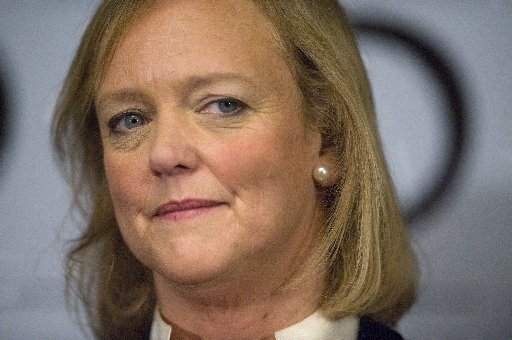Two weeks ago I had a chance to sit down with Gubernatorial hopeful Meg Whitman for the better part of an hour. Our interview covered a number of policy areas including global warming/AB32, eminent  domain, gun control, abortion, and philosophy about government. Because I had a digital recorder along, are able to bring you some direct excerpts from the interview.
domain, gun control, abortion, and philosophy about government. Because I had a digital recorder along, are able to bring you some direct excerpts from the interview.
THIS IS THE THIRD INSTALLMENT OF THIS INTERVIEW. YOU CAN READ PART ONE (ON THE ENVIRONMENT, GLOBAL WARMING, AND AB 32) CLICK HERE. YOU CAN READ PART TWO (ON PROPERTY RIGHTS) HERE.
Because of the location at which we met in Menlo Park on the San Francisco Peninsula, we’re calling these "Excerpts From The Peet’s Coffee Interview" — and here is a segment where we discuss the topic of abortion.
we’re calling these "Excerpts From The Peet’s Coffee Interview" — and here is a segment where we discuss the topic of abortion.
Let me preface this particular segment of our interview by saying that because of my strong personal believe in the sanctity of human life — that life begins at conception and from that very moment, that life deserves the same protections of any other person, that it was very difficult for me to hear, and is still incredibly hard for me to square that so many people, including Republican candidate Meg Whitman (and Steve Poizner and Tom Campbell for that matter) are not pro-life. They embrace what is to me is a tragic and selfish position that places, in essence, the convenience of an adult over the most basic human right of an unborn child – the right to live.
Infinitely unfathomable to me is that Meg Whitman takes what I consider to be an even more extreme position that can be summed up as saying that every expectant mother has the right, not only to an abortion, but to have one provided for them at taxpayer expense if they cannot afford one. Whitman does support some restrictions to when an abortion should be legal, which she talks about in the interview. By way of contrast, I do know from talking extensively on this issue with Steve Poizner that he is very much opposed to public funding of abortion. I’ve not discussed this with Tom Campbell, yet.
All of that said, I do think that it is fair to give Whitman credit for talking through this issue with me, knowing that: (1) talking about abortion is clearly off of her campaign themes, (2) talking about a difficult issue like this knowing that she is being interviewed by someone with a sharply contrasting views, and (3) knowing that our discussion would be published on this website.
I will close this preface by admitting that I got a bit unnerved just formatting this interview for your consumption. Someday California will hopefully, as it has before, have a pro-life Governor who believes that the right to life begins at conception — who can, at the very least, use the bully-pulpit of the office to decry this ongoing tragedy in our society. But we will have to come to terms that it will not be anytime soon, and not in 2010.
__ __ __ __ __
FR: Let’s have a thoughtful conversation about the sanctity of life issue, because I know it’s been talked about. I guess the first thing I would ask is how do you self-characterize your public policy position on the abortion question.
MW: You know that I want to run this campaign on economic issues, on jobs and spending and the economy, but I’ve been very straight-up on where I stand on these issues… I am pro-choice. I am for a woman’s right to choose. I am not for late term abortions or partial birth abortions. I actually voted in favor of the parental notification proposition, so that girls under 16 need to have their parents notified, because as a mother, I would want to know. But I don’t want to take that right away from women to make that choice.
FR: Okay. So does that, in essence, mean that you believe that life doesn’t begin at conception, but somewhere at viability or –
MW: Actually, I think every individual needs to make that choice for themselves. And I think women need to have the ability to make the choice of what they think is the right thing for them, for their families, for their personal situation.
FR: Until we reach one of these accepted points of –
MW: Absolutely, like late term abortion.
FR: So what’s a late term abortion?
MW: Well, I think it’s defined by statute, right, in the State of California, as the last three months or the last four months?
FR: Right. And you’re comfortable saying the last trimester, it would not be right.
MW: I am comfortable with whatever the exact statute is in California. I think it’s four months, but it might be three.
FR: So let’s talk about – because I think I read, but I want to make sure that it’s accurate – that you support the use of public funds –
MW: That’s correct.
FR: – for abortions. So if you go into this idea that the theory is that government money should be paid for things that are for the greater good, how would you justify taking, say, my tax dollars and spending it on something that I think we can all agree is controversial?
MW: Absolutely. It is controversial. And by the way, I respect your position on this. I really do respect your position on this, and smart, intelligent, nice people can agree to disagree on this because they are tough issues. My view is that if we are going to be pro-choice, that people do have the ability to have an abortion if they think it is the right thing for them, subject to the rules that we just described, that it needs to be available to all women, and whether you are rich or poor, you need to be able to access that right. And it’s unfair to women who can not afford an abortion, and that’s why I support public funding.
FR: So you would categorize it more as just another health care procedure, just like somebody who’s poor who is on public healthcare for everything else shouldn’t have this excluded from that. I’m just trying to –
MW: I understand. I would say yes. The fact of the matter is this is not just another healthcare procedure. This is not like a heart attack. This is not like a stroke. This is not like whatever. And so I think actually women spend a great deal of time thinking about this. This is an issue that I think women don’t take lightly. No women takes this lightly. And so they think through it on their own for their own situation, and on the choices that they want to make. And so if this is an available procedure, I think it needs to be available for all women.
FR: All right.
MW: Listen. You know what? People need to know where I stand, and what I have said is people will look at the whole package of attributes of my candidacy; my experience, what I bring to the table, my point of view on the social issues, and then people will weigh it. And if there are single issue voters, which there are on almost every issue, if I don’t agree with that person on that issue, whether it’s this issue or gay marriage or how I want to approach creating jobs in California, people just have to look at the whole package and say, “Okay. I don’t agree with her on every issue, but I like the general approach and I like her authenticity and what she says.

